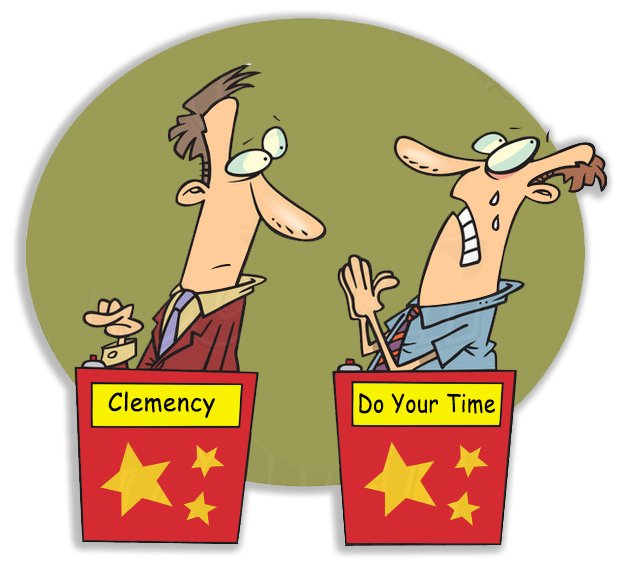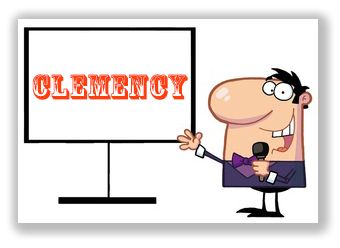We post news and comment on federal criminal justice issues, focused primarily on trial and post-conviction matters, legislative initiatives, and sentencing issues.

‘A CELEBRITY GAME SHOW APPROACH’ TO CLEMENCY
President Trump beat feet out of Washington for Europe last Tuesday after nominating a new Supreme Court justice, pausing only long enough to pardon Dwight and Steven Hammond, the father-son Oregon ranchers convicted of arson after brush-clearing fires they set on their land burned a few acres of a federal wildlife preserve.
 The ranchers, either notorious right-wing whack-jobs or afflicted small-businessmen (depending on your worldview), had already made enemies of the Federal Bureau of Land Management over cattle grazing issues. They got mandatory 5-year sentences, after prior shorter sentenced meted out by a Federal judge who thought the five-year bits “grossly disproportionate to the severity of the Hammonds’ offenses.” The U.S. Attorney, of course, appealed, and the 9th Circuit demanded the judge impose the mandatory minimums. The Hammonds’ case inspired a 40-day armed occupation of a federal wildlife refuge in 2016 protesting federal land ownership.
The ranchers, either notorious right-wing whack-jobs or afflicted small-businessmen (depending on your worldview), had already made enemies of the Federal Bureau of Land Management over cattle grazing issues. They got mandatory 5-year sentences, after prior shorter sentenced meted out by a Federal judge who thought the five-year bits “grossly disproportionate to the severity of the Hammonds’ offenses.” The U.S. Attorney, of course, appealed, and the 9th Circuit demanded the judge impose the mandatory minimums. The Hammonds’ case inspired a 40-day armed occupation of a federal wildlife refuge in 2016 protesting federal land ownership.
The Hammonds’ pardon raise the number of Trump clemency grants to nine, including Sheriff Joe Arpaio, deceased boxer Jack Johnson (supported by Sly Stallone), and Alice Johnson, whose commutation of a life sentence for drugs was championed by Kim Kardashian.
Last Thursday, The New York Times noted that
few constitutional powers lie so wholly at the whims of the president as the power to pardon. No details need to be worked out beforehand and no agency apparatus is needed to carry a pardon out. The president declares a person officially forgiven, and it is so. A layer of government lawyers has long worked behind the scenes, screening the hundreds of petitions each year, giving the process the appearance of objectivity and rigor. But technically — legally — this is unnecessary. A celebrity game show approach to mercy, doling the favor out to those with political allegiance or access to fame, is fully within the law.
Clemency seekers have been watching all of this. Having once put their hopes in the opaque Dept. of Justice pardon/commutation bureaucracy, the Times says, supplicants are now approaching their shot at absolution as if marketing a hot start-up: scanning their network of acquaintances for influence and gauging degrees of separation from celebrity. What’s the best way to get a letter to someone close to Trump?
 Clemency petitions go through the DOJ Office of Pardon Attorney, a system set up more than a hundred years ago to lessen the risks and hassles of leaving an entire nation’s pleas for compassion to one person. For decades, the process worked smoothly, and hundreds of clemency grants were issued each year. President Dwight D. Eisenhower alone granted over 1,000 pardons.
Clemency petitions go through the DOJ Office of Pardon Attorney, a system set up more than a hundred years ago to lessen the risks and hassles of leaving an entire nation’s pleas for compassion to one person. For decades, the process worked smoothly, and hundreds of clemency grants were issued each year. President Dwight D. Eisenhower alone granted over 1,000 pardons.
But starting about 40 years ago, “the prosecutors really got a hold of the process,” said Margaret Colgate Love, Pardon Attorney from 1990 to 1997. “They became increasingly hostile to the pardon power.” And as laws have grown harsher, the number of pardons has dwindled significantly. “It is so secretive and the standards are so subjective,” Ms. Love said. “They operate like a lottery. Except a lottery is fair.”
It is not all bad that Trump’s new system is going around DOJ. But for those without a famous sponsor, it is still as daunting as ever.
The Hill, Trump pardons Oregon ranchers at center of 40-day standoff (July 10, 2018)
The New York Times, Pardon Seekers Have a New Strategy in the Trump Era: ‘It’s Who You Know’ (July 12, 2018)
– Thomas L. Root

